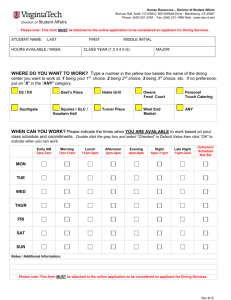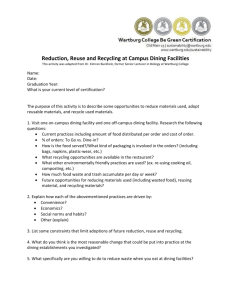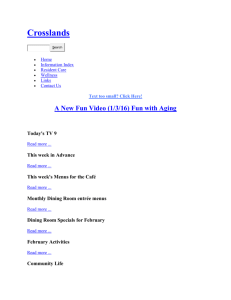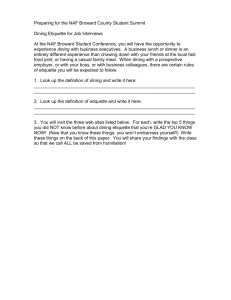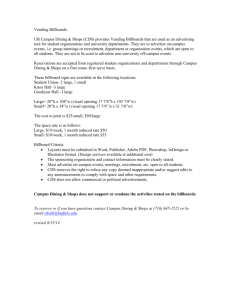7 DAY PLUS PLAN - Porter Khouw Consulting
advertisement
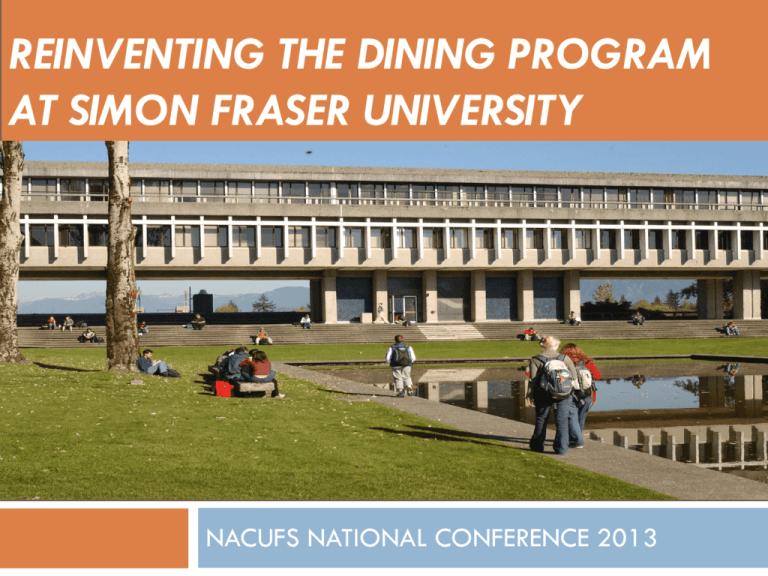
REINVENTING THE DINING PROGRAM AT SIMON FRASER UNIVERSITY NACUFS NATIONAL CONFERENCE 2013 Scope of Services Fast track project Qualitative& quantitative market research (February 2012) 1,400 responses to web-based survey Interactive Work Session with SFU Team Incumbent-only RFP rebid Contract negotiations New signed contract Summer 2012. 10-year contract with five, 1-year renewals Campus Overview Extremely diverse campus community Student body: 23,741 commuters, 1,787 residents Housing: 99% occupancy Many students take classes on main campus (Burnaby) & in Vancouver President Petter’s strategic vision is for SFU to be “the leading engaged university defined by its dynamic integration of innovative education, cutting edge research & far reaching community engagement.” Dining Program Spring 2012 A la carte with one residential dining venue & multiple dining locations plus catering & vending. MacKenzie Café Tim Horton’s Triple O’s Simon C-Store DAC Food was perceived as “expensive.” Athletes were not satisfied. Provider had been on campus for 10 years. Meal plan revenue had dropped approximately $250K since 2009. Campus Dining Challenges Limited hours of operation Not aligned with student clock Minimal service at 7 p.m. Monday-Friday & on weekends including at the residential dining hall. Meal Plans 776 meal plan holders Drop off after first year Zero voluntary participation Meal plan designed to provide 2 meals/day, 5 days a week. 43% of residential student participation “We assumed students would eat off campus on weekends.” SFU lowered the price of the meal plan from $1,350 to $900 in the Spring to eliminated leftover meal plan money. Consistently low marks in Globe & Mail and other surveys. Campus Dining Challenges Fairly high dissatisfaction with the dining program (value, hours, menu variety, meal plans, etc.) 30% of survey respondents in Fall 2011 survey were dissatisfied or very dissatisfied. “Dining hall is sterile.” Menu variety was lacking, customers were bored “It’s basically impossible to eat three meals a day on the meal plan & not run out of credit before the semester ends.” “Restaurant pricing without the restaurant experience.” Dissatisfaction with catering/revenue was low. PKC’s Goal To develop the optimum dining program for SFU students, faculty, staff & visitors. Questions we asked: What is the optimum dining program for SFU’s unique campus? How do we organize dining in order to optimize social engagement? Do existing facilities need to be enhanced? What will it cost? How To Determine the Optimum Dining Program Ask Yourself These Questions What is the optimum dining program for our unique campus? How do we organize dining in order to optimize social engagement? Do we need to enhance facilities? What will it cost? How do we secure the optimum contract (as applicable)? Designing the Optimum Dining Program at SFU Complete a campus-wide master planning study. Study current customer habits & preferences Determine optimum program elements: Hours of operation Menu variety & selection Ambiance/amenities Meal plans Catering Vending Completing this step help create the building blocks needed to create a strong customer-based, innovative dining program. Areas to Consider When Thinking Ahead How & in what venues will customers be able to use meal plan money? How do current staffing schedules need to be modified to meet customer demand & extended hours of operation? What menu offerings are going to be available in each venue? What kind of equipment layout/utilities will be needed? What changes to the campus landscape (new building, new arteries through campus) could impact the success of the dining program? Are our current facilities undersized & how large do they need to be to accommodate any changes in enrollment? What impact will these proposed changes have on your department’s bottom line? Creating a campus-wide dining services master plan will help answer these questions! Determine Who You Are • What makes your campus unique? • Demographics • Geography • Culture • Traditions • Preferences • Growth plans/enrollment • Political environment • Financial realities GOAL: To expand & enhance the student dining experience. Determine Who You Are Ask these questions: What is your retention rate? What is your missed meal factor? Is meal plan participation up or down? Are the meal plans a good value or not? Can students use their meal plans when they want to? Is there a lack of social connectivity on campus? Does the program attract or subtract from student life on campus? Market Research Interview students & stakeholders. Directors of admissions, housing, res life and advancement (retention) Residential & commuter students Faculty & staff Catering customers & conference planners Campus administrators Determine customers’ perceptions regarding: Hours of operation Monday-Friday & Saturday and Sunday Menu variety Meal plans Methods of service Locations Ambiance Speed of service Customer service Market Research Survey the campus community including students, faculty & staff. Where are customers eating off campus/calling for delivery? What time of day/night? How do they pay for purchases? What they do now is a better indication of what they will do. Use market research determine where the program is lacking & where opportunities lie. OUT Market Research Evaluate your facilities. Do they meet today’s standards or are they in a time warp? Are they competitive with your cross applicant schools? How much deferred maintenance exists? OUT Optimum Dining Program Develop the optimum dining program for YOUR campus. Elements should include: Concepts Brands Hours (Monday-Friday & weekends) Menu variety Meal plans Methods of service Methods of payment Locations Ambiance Speed of service Customer service Catering service OUT Optimum Dining Program Financial consequences How will meal plan participation change, especially with growing enrollment? How much more labor will you need or how can the current labor be better utilized? If you open new locations, how many operating days will they be open and what will the average check be? How will your operating expenses change? How much can you anticipate growing your bottom line in a five-year period? Focus on growing revenues, not just cutting costs. OUT Optimum Dining Program Identify necessary facility changes. Facilities should be designed to functionally support the optimum dining program. Do the current spaces need to enlarged or redesigned to ensure easy customer throughput & the ability to provide top-notch service? How many customers does each facility need to support at the peak meal period? Will this change in the future? How much will it cost to make changes? Before For this project, PKC created demand analysis to determine square footage requirements & capital cost investments (including planned enrollment). After A New Vision for Dining at SFU Anytime Dining 24/7 in Residential Dining Commons Unlimited access featuring unlimited seconds & made-toorder food 24/7. More cooked to order & display cooking (eatertainment) Menu variety expanded to respond to customers’ requests for different types of food offerings including sushi Extreme makeover! State-of-the-art servery with interactive stations Inviting seating area with a variety of options (booths, banquettes, high-tops, etc. ) Contemporary & inviting colors, lighting, merchandising SFU colors & memorabilia Add checker Amenities Free printing Meal plan holders may print up to 20 B&W impressions per day at no charge to them Digital menu boards Text N Tell Collabrative PC station Cell phone chargers Flat-panel TVs Soft seating High-top tables, counter seating, banquettes, community tables. Free wi-fi Fireplace with soft seating Power outlets (lots) MacKenzie Cafe PKC recommended offering anytime dining here as well from 7 a.m.-10 p.m. Monday-Friday but SFU elected to keep this an a la carte food court for now. Venue was completely remodeled into an International marketplace to reflect SFU’s diverse community. New menu options include: Freshly-made sushi Pho bar All Day Breakfast Wood burning pizza oven Traditional favorites Deli Salad Bar Stir Fry Other Retail Options Maintain Triple O’s. Maintain Tim Horton’s in West Mall. Maintain Renaissance Coffee locations. Maintain lunch service at DAC. Open café as planned in the Fraser International College. Plan to create the Convocation/Library Café on East Campus. Subway/Tim Horton’s Up to eight registers for quick service 7 a.m.-10 p.m. Monday-Thursday& Saturday and Sunday, 7 a.m.-8 p.m. on Friday Methods of Payment Meal plan money/unlimited access Dining Dollars Cash Credit/debit cards Consider biometric hand readers Unlimited 24/7 Access Anytime Dining Meal Plans 7 DAY PLATINUM PLUS: Eat 7 days a week all you care to eat plus $500 Super Savings Dollars & 8 VIP passes for use at the Residence Dining Hall. Cost: $2,200/semester. 7 DAY PLUS PLAN: Eat 7 days a week all you care to eat plus $250 Super Savings Dollars to use at Triple O’s, Tim Hortons, Subway, Mackenzie Cafe, Simon C's Store and the door rate at the Residence Dining Hall. Cost: $1,950/semester 7 DAY BASIC PLAN Eat 7 days a week all you care to eat. Cost: $1,680/semester 5 DAY PLUS PLAN: Eat 5 days a week; all you care to eat plus $150 Super Savings Dollars to use at Triple O’s, Tim Hortons, Subway, Mackenzie Cafe, Simon C's Store and the door rate at the Residence Dining Hall. Cost: $1,650/semester 5 DAY BASIC PLAN Eat 5 days a week; all you care to eat. If you order a 5 Day Meal Plan. Cost: $1,350/semester What Is Social Architecture ? TM Emotional Connections Gravitational Pull Toward dining venues Students & school Design Meaningful Social Connections Last a Lifetime Social Energy Universal Appeal Sense of Community Heartbeat/Living Room/Kitchen Compelling Benefits of Social ArchitectureTM Higher Recruitment Capture Rates Higher % Alumni Involvement Higher Retention Rates Higher GPAs Higher Quality Housing Higher Graduation Rates The DNA of a Successful Anytime Dining Program Anytime Dining Meal Plans Continuous Hours of Operation Extended Hours of Operation Menu Variety & Selection State-of-the-art Facilities Retail Approach Optimum Value Value Proposition Access Driven: Anytime Dining Promotes less food waste/consumption Provides ultimate in flexibility Appeals to parents/easy transition from home No leftover meals Higher gross profitability Lower food cost (21-28%) Voluntary meal plan participation increases Consumption Driven: Meals Per Week/Semester Promotes food waste Unnecessary spending Less gross profitability Meals must generally be consumed during certain time periods. Leftover meals/dining dollars causes dissatisfaction Does not appeal to parents Moving Forward Using the master plan as a guide, PKC completed an incumbent-only rebid of the campus dining contract. New contract commenced June 1, 2012. Results Meal plan participation is up 30%. SFU sold 840 meal plans in Spring 2013. Commuter students are voluntarily buying meal plans. For Summer 2013, up to 271 plans sold, expected to sell 100. Housing & student retention is up. Customer satisfaction has soared & overall participation is up. SFU is considering building a second anytime dining venue in UniverCity in a condo complex based on the popularity of the Dining Hall. The My Pantry area in the Dining Hall is very popular. Overall remuneration significantly improved compared to previous contract. Video THANK YOU! Questions?
